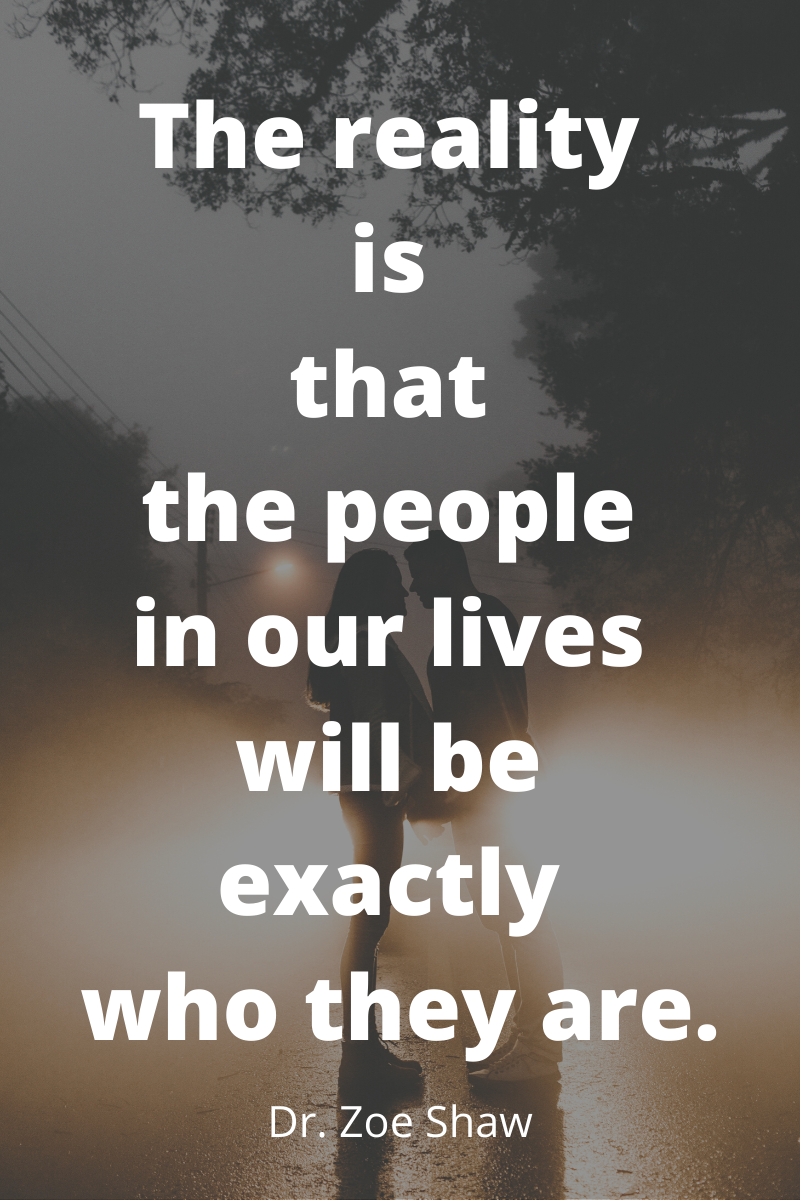I love Dr. Maya Angelou’s quote “When people show you who they are- believe them”. It’s so good because most issues we have in relationships are that people will tell us who they are, but we decide to create a romanticized version of them instead.
This gets us into trouble because when we interact with a fantasy of our partner, we get really upset when they don’t act out their part. Half the time they don’t even know their part, because it’s all made up in our head…
Men vs. women
This tendency for women to romanticize their relationships starts way, way early in our development. And we don’t just do it in romantic relationships either. We do it in friendships, we do it in all areas in our life. That’s why women tend towards more relational drama than men.
There’s that saying, “ men marry a woman expecting her not to change, and she does. Women marry a man expecting him to change, and he doesn’t.” Men see people for who they are and either accept them or not. So there’s no disappointment and less drama.
We women are socialized from birth, and through Disney, that we will live happily ever after because the people in our lives will be wonderful and everything we want them to be. But the reality is that the people in our lives will be exactly who they are.

How do you know if you are romanticizing your relationship?
I’ll give you a few signs that indicate you’re romanticizing your relationship.
1. You’re always focusing on his potential. You see him for what he could be, not who and what he is. It would be amazing if he lives up to his potential. But not everyone wants to, and not everyone does. But everyone wants to be loved for who they are, right now, flaws and all! When you are so focused on who you want him to be, you’re loving a fantasy.
2. Your values have changed since you started the relationship. This is you lying to yourself. You want him so badly, that the values and beliefs you used to hold true are not important to you anymore. Don’t lose yourself like this! You are far too valuable to be lost. I often say that if you changed your ideas to help you stay in a relationship, your new ideas aren’t yours. That was not just you growing and maturing, that was you denying and rationalizing.
3. You are often surprised and disappointed in his behavior. If you know him, you should have realistic expectations of him. He won’t surprise you regularly if you are being honest with yourself about who he is.
4. You’ve been doing this for years and you keep thinking it’s going to get better. It’s not… You need to figure out if you can accept what is.
Take off your rose colored glasses
So if you recognize yourself in any of those signs, the very best and maybe painful thing that you can do for yourself is to look at your relationship with the rose colored glasses off.
Who is he? What does he believe? How does he walk out his values? How does he respond to you and yours? Who is he today?
Let’s look at that guy, he’s the one you are with. If he didn’t change an iota, can you accept and be happy with who he is? He’s not perfect. None of them are, none of us are! But is this a guy you can live out the rest of your life with as he is today?
If the answer is yes, then that means you need to let him be who he is and stop romanticizing who you want him to be. Stop trying to change him. Work on yourself instead.

Fix your boundaries
But if the answer is no, it doesn’t mean he has to change. It means you have to fix your boundaries regarding what you will and won’t tolerate. Wait, but doesn’t that mean he has to change? No, not necessarily. When you change any part of a system, the system will change. Trying to change him, will create resistance. Trying to change you will create a ripple effect. Changing you is not romanticizing, it is responding to what is.
For example, let’s say that every few weeks, your husband comes home from work and he’s rude and irritable. He’s taking his bad day out on you. You get upset every time. It starts a whole negative spiral in your relationship, because your feelings are hurt.
You two have a cyclical argument about it, and he vows to work on it. The husband you want him to be comes home and is glad to see you, greets you with a kiss, and asks about your day. You expect him to change (that’s romanticizing) and feel disappointed again and again. It’s an issue in your marriage.
What if, instead, you recognize and point out the unhealthy pattern, expect it, and let him know that when he comes home in a bad mood, you will disengage, not interact or otherwise leave his presence. That’s putting up a boundary.
Then when it happens again, do that. Not with anger, because you already know him and expected it. But in a matter of a fact way so that he knows it’s a clear boundary.
He will recognize that you aren’t going to be his punching bag anymore. If he chooses to act a certain way, he will lose something. You take care of yourself in the process and he may choose to change his behavior. That’s his choice. You’re choosing self care.
I’m not trying to get you to leave your man. Let me be crystal clear about that. Although if that’s what you need to do, I support you in that too. The point of this blog post is to help you stop the pain that you are inflicting on yourself, day after day, by romanticizing him or the relationship.
You can see him for who he is and have a relationship with that guy. It will include a relationship of more acceptance, less disappointment, less anger, less sadness. Or you can admit that this isn’t a relationship you are willing to accept and figure out how to erect healthier boundaries or exit.
When you stop romanticizing, you start taking responsibility for yourself and your own happiness. As a result, your life is a little better.
Reach out if you have any questions, I would love to answer them!
Would you like to listen to this post? Click here to listen to the podcast version! Enjoy!
Share this Post


Comments
This. This post is absolutely amazing. So simple, so straight to the point, and exactly what I needed to read. I’d love to know more about setting boundaries and seeing examples of that, do you have another post on this? Absolutely love this post. Thank you for sharing!